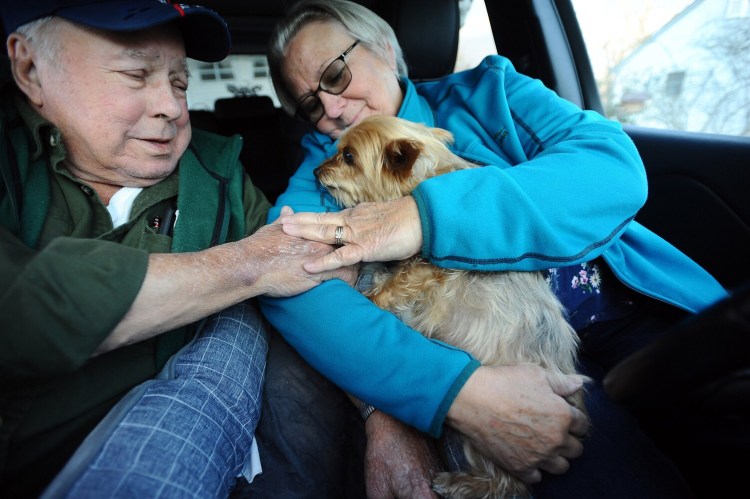OAKLAND — After a three-week, sun-splashed trip to Florida, Karen Veilleux was driving with her husband back up Interstate 95 to their home in Oakland when she took a call from her sister.

Veilleux was warned by her sister, with whom the couple had been visiting in Leesburg, Florida, that the rain they encountered in Virginia on Monday would soon turn to snow, a lot of it.
Veilleux, a 64-year-old retired nurse and lifelong Mainer decided to keep driving.
“I never dreamed that we’d run into snow there,” she said.
Around noon Monday, only about 2 miles from an exit near Stafford, Virginia, where they planned to find a hotel room, traffic came to a standstill — and stayed that way for a grueling 22 hours.
Virginia Gov. Ralph Northam said at a news conference Tuesday that public works crews were prepared for a few inches of snow, but the area unexpectedly saw more than a foot of accumulation.
The Veilleuxes were among hundreds of people stuck on the East Coast’s main north-south highway in freezing temperatures after the winter storm caused a semi-truck to jackknife Monday, initiating a chain reaction of crashes that blocked a 40-mile stretch of the highway in both directions between Richmond and Washington, D.C.
Snow was falling up to 2 inches per hour at the time.
Veilleux said growing up in Maine and her mother always preaching preparedness enabled the couple to weather the storm as comfortably as possible with their Yorkshire Terrier Sophie.

Oakland couple Karen and Bob Veilleux show samples of the food they had with them when they were stranded for 22 hours on Interstate 95 in Virginia earlier this week. Rich Abrahamson/Morning Sentinel
“(My parents) brought us up to always be prepared for anything, always to help people,” she said. “You live in Maine, you never know what the weather’s going to do.”
The couple’s Jeep Cherokee was stocked with an electric blanket, a change of clothes, baby wipes, paper towels, toilet paper, boots, food, water, Diet Pepsi, and Bob Veilleux’s diabetes medication. Karen Veilleux also said she never lets her gas tank fall below half full, especially during a road trip.
“Thank God I did because some people ran out of gas, some people had kids that had no extra clothes, warm clothes or food,” she said. “Actually we made out really well compared to some other people, but I still think being from Maine prepared me for that.”
After the first three hours, Veilleux began to conserve gas by running the Jeep for 15 minutes every hour during the 15-degree night. She said there was never any indication from authorities when traffic would start moving again.
“They couldn’t come treat the roads because no one could get in,” she said.
Because of the rain that preceded the snowstorm, the ground was frozen and nearly impossible to walk on, confining most people to their vehicles. Veilleux used a set of old bath towels to create a path to the back of the Jeep where she could retrieve supplies, particularly her 80-year-old husband’s diabetes medication.
“No one could really get out of their vehicles to help each other because it was all ice,” she said.
In order to keep loose, Karen Veilleux did leg exercises while in the SUV and the couple tried to make light of the situation to keep their spirits up.
“To be in it, it’s just hard to explain. Mentally we did OK, we joked about it and had fun. We just held together. Physically it was very wearying because you’re in that vehicle,” Veilleux said.
She said she dealt with leg cramps and her husband fell when he first got out of the Cherokee because he hadn’t moved in so long.

Bob Veilleux, 80, and his wife, Karen, 64, were able to reflect lightheartedly on a snowstorm that left them stranded for 22 hours on Interstate 95 in Virginia earlier this week. They are shown Thursday at their home in Oakland. Rich Abrahamson/Morning Sentinel
Finally, around 10 a.m. Tuesday, traffic started moving and the couple began navigating a maze of abandoned vehicles to get off the highway. A few hours later U.S. Route 1 opened up and the couple drove that road for seven hours before stopping for some rest.
But there were no hotel rooms available. The couple ended up sleeping in the Cherokee in the parking lot of a shopping center, along with several other people who were in the same situation.
They departed early Wednesday morning to beat traffic, arriving back home in Oakland that afternoon.
“It was an ordeal, but we did come through it,” she said.
The Associated Press contributed to this report.
Send questions/comments to the editors.


